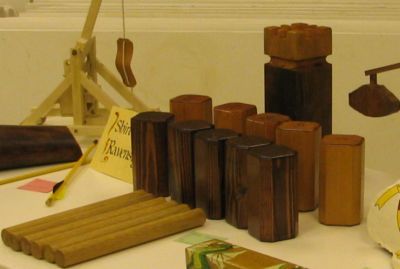Kubb: Difference between revisions
No edit summary |
No edit summary |
||
| (4 intermediate revisions by 3 users not shown) | |||
| Line 1: | Line 1: | ||
[[Image:Kubbset.JPG|frame|right|Kubb Set, Made by Lord [[Thórbjórn Bjórnsson]].]] | |||
==Description== | ==Description== | ||
Kubb (pronounced koob) is a game of throwing wooden dowels or rods (batons) at wooden blocks (kubbs) in an effort to knock them down. Each team of one to six players alternates in taking turns in tossing the the six batons at the other teams five kubbs. Kubbs knocked over are tossed into the opponents half of the playing field, and set back up. | Kubb (pronounced koob) is a game of throwing wooden dowels or rods (batons) at wooden blocks (kubbs) in an effort to knock them down. Each team of one to six players alternates in taking turns in tossing the the six batons at the other teams five kubbs. Kubbs knocked over are tossed into the opponents half of the playing field, and set back up. | ||
| Line 13: | Line 15: | ||
*[http://www.vmkubb.com/index.asp Kubb World Championships] | *[http://www.vmkubb.com/index.asp Kubb World Championships] | ||
*[[Wikipedia:Kubb]] | *[[Wikipedia:Kubb]] | ||
[[Category:Culture]] | |||
[[Category:Games]] | |||
Latest revision as of 12:14, 12 August 2015

Description
Kubb (pronounced koob) is a game of throwing wooden dowels or rods (batons) at wooden blocks (kubbs) in an effort to knock them down. Each team of one to six players alternates in taking turns in tossing the the six batons at the other teams five kubbs. Kubbs knocked over are tossed into the opponents half of the playing field, and set back up.
Play continues until all of an opponents kubbs are eliminated, at which point the larger King, set up in the center of the play field, may be attempted. The first team to knock down the King wins, but knocking down the King before all the opponents kubbs are down results in a loss.
History
Kubb has been marketed as having come from Viking times, and having first been played with pieces of wood gathered for fires. The game has become increasingly popular modernly, and this, in conjunction with it's purported origins, make it a likely subject for SCA play.
However, documentable history for the game, prior to the 1990's, has not been found.